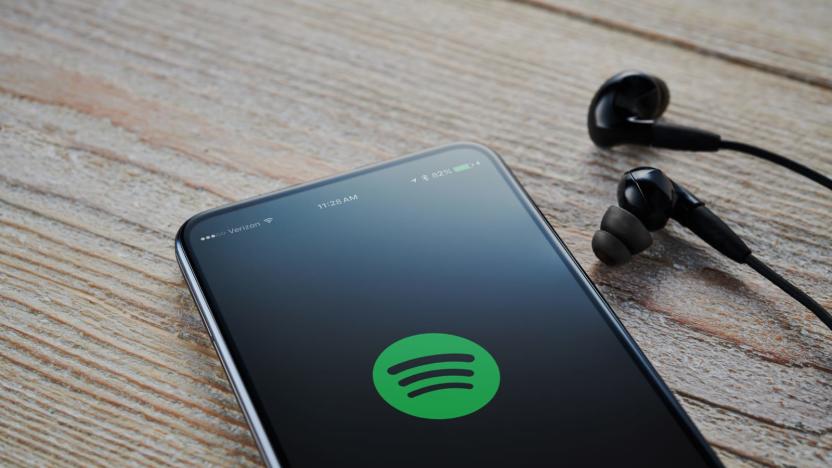royalty
Latest

Spotify claims it 'overpaid' songwriters and wants its money back
Spotify and music publishers have been in a bit of a tiff for months over a planned royalty rate increase that would require streaming services to pay more to artists. You can bet the company is watching the numbers closely, especially while it appeals the new rules. Spotify now claims that it overpaid songwriters and publishers last year, and now it's asking for its money back, according to Music Business Worldwide.

Apple and Qualcomm settle royalty lawsuits with new patent agreement
And just like that, the bitter feud between Apple and Qualcomm is already over. The two companies have settled their patent royalty dispute, ending all ongoing legal action (including with Apple's manufacturing partners). Apple has agreed to pay Qualcomm an unspecified amount, while both sides have struck a six-year patent license deal as well as a "multiyear" wireless chipset supply deal.

Apple signs Prince Harry and Oprah for new mental health docu-series
Celebrity royalty is commonplace on streaming services, but Apple+ has just gone and snagged an actual royal. It's teaming Prince Harry (aka the Duke of Sussex) with Oprah Winfrey on a new mental health docu-series. The Prince, who's also exec-producing alongside Winfrey, announced the news on Instagram. It arrives on Apple+ in 2020, before which we should get more information, including a title.

Tech giants are lined up behind the 'royalty-free' 4K codec AV1
Usually, when a new video compression scheme arrives it takes so long before there's a combination of compatible hardware and content that its arrival is anticlimactic. Google, Apple, Netflix, Microsoft, Intel, Amazon and a host of other companies have taken steps to make sure AOMedia Video Codec 1.0 (AV1) moves a bit faster, and for several good reasons. Today they're teaming up to announce the release of a 1.0 specification for AV1, and get the ball rolling on support for video creation, distribution and playback with the new format. With AV1, the group promises it can deliver 4K UHD video using 30 percent less data. That's great for high-res streams and should provide plenty of savings even for those on older hardware -- expect faster video startup time, less buffering and better picture quality.

YouTube deal ends years-long fight over music videos in Germany
German music fans haven't had it easy in the past 7 years. A royalty dispute with music rights group GEMA has forced YouTube to block thousands of music videos in the country, leaving locals no choice but to either find alternative video sources or (gasp) settle for audio alone. At last, though, they can relax: GEMA and YouTube have reached a deal that makes sure GEMA members get paid for video streams. The exact terms of the deal aren't public, but it'll cover both the usual ad-supported free viewing as well as the eventual European launch of YouTube Red subscriptions.

Drones are pestering Spain's royal family
France isn't the only European country grappling with suspicious drone flights, it seems. Reportedly, guards at the Spanish royal family's La Zarzuela palace have spotted numerous robotic aircraft flying through its airspace at night, including the residences. That's bad enough by itself, but the kicker is that radio jamming isn't working -- short of breaking out guns, the guards can't just bring these machines down.

Samsung worries that its Microsoft royalty payments amount to collusion
Samsung was quick to cite the acquisition of Nokia as a reason for holding out on Microsoft's royalty payments, but there weren't many details. Just what had it spooked? Thanks to some new court filings, we now have a clearer sense of its motivations. Simply put, the Korean tech giant is worried about "charges of collusion" now that Microsoft is a direct competitor in the smartphone business. The patent deal requires that Samsung not only make Windows Phones, but hand over sensitive business details -- both big problems when Microsoft could use them to gain a competitive edge. Samsung already stopped handing over those trade secrets over jitters that American antitrust regulators would step in.

Court rules that Pandora won't pay higher royalties to songwriters (update: ruling details)
Pandora has been fighting tooth and nail against potential songwriting royalty increases, and it appears that this tenacity is largely paying off. A court has ruled that the streaming radio service should pay the same 1.85 percent royalty rate that it has paid for years, resisting both Pandora's call for 1.7 percent (like traditional radio) and the American Society of Composers, Authors and Publishers' (ASCAP) demand for 3 percent. Details of the ruling are under a court seal, so the motivations behind the decision aren't yet clear. However, ASCAP is more than a little upset by its loss; it sees the verdict as proof that full-scale licensing reform is necessary to "reflect the realities" of modern music. Whether or not that's true, the Society may have inadvertently sabotaged its own case. It pointed to iTunes Radio's higher royalty rate as a model for fair compensation, but Apple is willing to make little to no profit from its music services -- ASCAP may have unintentionally suggested that its proposal wasn't realistic. Update: A week later, the details of the ruling are available. The judge determined that ASCAP was colluding with publishers to force Pandora to pay higher rates; it would ask publishers to leave the group so that they could negotiate more lucrative deals on their own, raising their royalty demands to give ASCAP more leverage at the rate court.

Nintendo to pay royalty to 3D patent holder for every 3DS unit sold
A U.S. federal judge has established a royalty rate Nintendo will pay to Tomita Technologies International for every Nintendo 3DS handheld console sold worldwide. The ongoing fee stems from a a 2011 lawsuit that found Nintendo liable for damages after infringing upon Tomita's glasses-free 3D technology patent. Engadget reports that Nintendo will pay Tomita 1.82 percent of the wholesale price of every 3DS and 3DS XL sold over the portable hardware's lifespan. The judgment does not apply to the recently released Nintendo 2DS hardware revision, which abandons the handheld's 3D display as a cost-cutting measure. A federal jury ruled in favor of Tomita in the company's patent infringement lawsuit earlier this year, awarding damages that were later reduced to $15.1 million.

Nintendo forced to pay a share of every 3DS sale to another company
While Nintendo's Wii U console sales continue to frustrate, its handheld gaming business offers hope of a better future. But even as its 3DS and 3DS XL consoles continue to outsell their rivals, Nintendo will have to come to terms with sharing a percentage of each sale with another company. In December, the company was told it must pay 1.82 percent of the wholesale price of each 3DS sold after it was found guilty of infringing on patented camera technology owned by Tomita Technologies. It means that Nintendo could pay up to $3 for each unit, for as long as it continues to sell the console. Given it sold 2 million 3DS and 3DS XLs last quarter, putting the current lifetime total at 35 million, demand for the handhelds is still strong. Nintendo's already paid a $15 million damages award (down from $30.2 million in March 2013), but faces the prospect of sending Tomita smaller payments well into the future.

And so it begins: Royal Baby App hits App Store
Future PLC puts out some incredible titles: MacLife, PC Gamer, T3 and dozens more. But being a publisher, they're always looking for new stuff to sell, so if it had to be anybody, why not them? The company has just released the Royal Baby App that, you guessed it, is dedicated to the impending arrival of Kate and William's as-of-yet unborn child. There hasn't been this much excitement in the air about a birth since a baby supposedly came into the world in a manger more than 2000 years ago. And not just here in Britain. In America, people lap up Kate and William baby news like it's a hot fudge sundae in Death Valley (and I'm an American living in London, so it's okay for me to make fun of people on all sides of the pond about this). So what does the app get you? Pictures, of course, of when the most privileged child on the planet arrives. Plus all the news you can take about someone else's child, which, ironically, seems to be contradictory to what one would expect considering that most people profess to loath seeing too many pics of their friend's and relative's kids on their Facebook feed. Royal Baby App: Kate and William's birth celebration is a free download with several in-app purchases.

Pandora establishes 40-hour mobile listening cap for free users
Remember the good ol' days of Pandora? Well, it turns out that you were living in it until today. Just this afternoon, the music streaming service revealed that it's become necessary to return to the 40 hour caps from times long ago -- only this time around, it applies only to mobile users. If you may recall, Pandora dropped these caps in September 2011, but steeper royalty costs have forced the company's hand in the matter. What does this mean for you? Well, unless you fit within the four percent of Pandora listeners that jam out on a mobile device for more than 40 hours per month, you're unlikely to ever notice the change. Meanwhile, heavy users will need to pay $0.99 to continue listening for the remainder of the month. Naturally, you can also lay down $3.99 per month (or $36 per year) for Pandora One, which will kick both those limits and pesky ads to the curb.

Apple ready to license its nano-SIM design for free, on one not-so-nano condition
If you hadn't heard, there are two rival nano-SIM designs going around, but there's only room for one of them to become an industry standard. Nokia, Motorola and RIM sit together in one corner, and we've already covered why they think their design is superior. On the other side of the ring sits Apple, which has its own tactics for bringing ETSI, the European Telecoms Standards Institute, over to its way of thinking. According to a legal letter shown to FOSS Patents by a "perfectly reliable source", Apple is prepared to license its nano-SIM design royalty-free, so long as it becomes the new standard and all other nano-SIM patent holders reciprocate the gesture. Such a gambit may not appease Cupertino's rivals and it certainly doesn't address their technical concerns, but it might show that Apple isn't looking to profit out of this particular format war and is simply continuing its quest for greater clarity on FRAND licensing terms. Then again, it could all just be lawyer-speak.Update: Nokia has responded to Apple's move, making it clear that it still prefers its own design. Mark Durrant, director of communications for the Finnish firm said, "the principal issues remain the technical superiority of our proposal and that Apple's proposal does not meet the pre-agreed ETSI requirements... Apple's proposal for royalty free licensing seems no more than an attempt to devalue the intellectual property of others." We expect this to go back and forth a few more times.

Paul McCartney: 'You can keep free streaming for the birds and bees, now give me money'
A wise man once told Engadget that streaming and bought music services could live side-by-side like a piano keyboard. It looks like impoverished multi-millionaire Sir Paul McCartney didn't hear that particular song, as he's withdrawn all of his music from streaming service Rhapsody, after doing the same to Spotify some time ago. He's the latest in a long line of impecunious artists including Adele, Coldplay and Tom Waits, who have done the same as they feel they're not getting fair compensation for their labors. It would be cynical to point out that McCartney's move comes just ahead of a live performance that's exclusively streamed on the iTunes music store and Apple TV, so we won't.

Microsoft and Wistron come to terms in royalty agreement, Android and Chrome OS now targeted
We're seeing a heavy surge in Microsoft's relentless pursuit of licensing deals in light of recent patent-infringement claims. Wistron Corp, a spinoff of Acer, is the latest company to make an agreement with Microsoft in a string of lawsuits and royalty clashes that's spanned the course of two months. While we've seen Android suppliers such as Itronix and Velocity Micro come to agreements with the folks in Redmond, as well as others like Motorola and Barnes & Noble becoming courtroom fodder, this is the first time Chrome OS has been targeted. Wistron's an ODM (original design manufacturer) that supplies other companies with computers, tablets and e-readers using either Google OS, so it's not necessarily a surprise that it signed up for the Microsoft lawsuit prevention plan. Scant details are available aside from the fact that royalties will be collected as a result. Now that Chrome is involved, it not only shows that Team Ballmer isn't backing down, it appears to have even more companies in its crosshairs -- we just wonder who's next on the list. Full (albeit brief) PR after the break.

Queen dons Swarovski-encrusted 3D glasses, shows us how bling is done
It's a tough life being a monarch nowadays. The halcyon times of extravagant debauchery and debauched extravagance are all but over, having been replaced by expectations of stoicism and perfectly measured hand waving. Trying to subvert this trend of royals boring us to tears, Britain's Queen has come out with a pair of Q-emblazoned 3D glasses that frankly redefine the way we look upon bling. Articulated with some good old Swarovski crystals, the spectacular spectacles were thought up by her majesty's dresser, Angela Kelly, and were brought out during a state visit to Toronto's Pinewood Studios. Now the only question left is which gangster rapper will try to outdo Queenie from the block?

Japanese government to levy royalty fees on BD-Rs / Blu-ray recorders
We just can't see this one going over well. Reportedly, Japan's Economy, Trade and Industry Ministry and the Education, Science and Technology Ministry have jointly decided to administer royalty fees on all blank Blu-ray Discs (BD-R / BD-RE) and Blu-ray recorders. According to the entities, such a system is necessary to "compensate copyright holders for the increase in copying by individuals due to the development of new digital technologies." It was also noted that there was some disagreement on whether all HDD-based recorders should be taxed (not to mention those oh-so-innocent portable media players), and further "discussions" could make the fees applicable to even more hardware. Tax everyone for the actions of a few -- sounds like a totally infallible plan, no?

Law of the Game on Joystiq: Royalties 101
Each week Mark Methenitis contributes Law of the Game on Joystiq, a column on legal issues as they relate to video games: With all the recent bru-ha-ha about Microsoft restructuring the XBLA royalty scheme, it seemed like an opportune time to discuss royalties as a whole. Royalties are a legal construct based around intellectual property, and are the basic way the business of intellectual property can function. In fact, I spend a good portion of my time writing up royalty agreements for all sorts of products, and while this may sound like a personal hell to many of you, I do actually enjoy it. And honestly, whether your dream is to create video games or make music or write books or something else along these lines, an understanding of royalties may help you out in your career. Given that Microsoft won't share its royalty specifics, I'm going to stick to the general concept.So, what is a royalty, anyway? In a broad sense, it's a payment received for use of an intellectual property right. To be more specific, it's a payment for some right to a copyright, trademark, patent, or even a trade secret. (As a side note, certain kinds of payments for mineral rights are also termed 'royalties.') Here are some of the most common examples of a royalty in action:

Queen Elizabeth II on Wii: One approves
We always suspected that the Wii, much like the toilet, could be a great social leveller. After all, no matter how blue your blood, anybody is going to look like a bit of a plum playing Wii Sports. Obviously, that doesn't remotely faze us (we're not very cool people anyway), it shouldn't faze you, and it certainly doesn't faze Queen Elizabeth II.Yeah, you heard us: according to British red-top The People, Her Maj is the latest fan of Nintendo's console, and something of a pro at Wii bowling. The monarch discovered the Wii after her grandson, the prematurely balding Prince William, received one of the rare consoles as a Christmas gift from his girlfriend. We actually really love the mental image this story conjures up: the 81-year-old Queen swinging blissfully away while being watched by Wills, Harry, Phillip, several corgis, and various Royal Family underlings, and then getting roundly applauded for knocking down a single pin.Seriously though, ma'am, it's good to know you're having fun with our taxes your new console. Welcome aboard![Via NeoGAF]

RIAA demanding XM-Sirius pay higher royalty rates
In the unceasing feud between the RIAA and satellite radio, the agency has rekindled the fire by encouraging the FCC to "require the merged companies to pay higher royalty rates to the record industry." Reportedly, the RIAA argued that the firms were "no longer new, struggling companies that could get away with paying below-market rates," and further salted the wound by insisting that the FCC "make clear that its approval of a merger was conditioned upon the continued protection of sound recordings from unlawful infringement." Of course, a number of senators have already voiced their concern for more limitations on satellite radio streams, but unsurprisingly, it seems like the RIAA wants these lofty wishes to become reality (and in a hurry).










